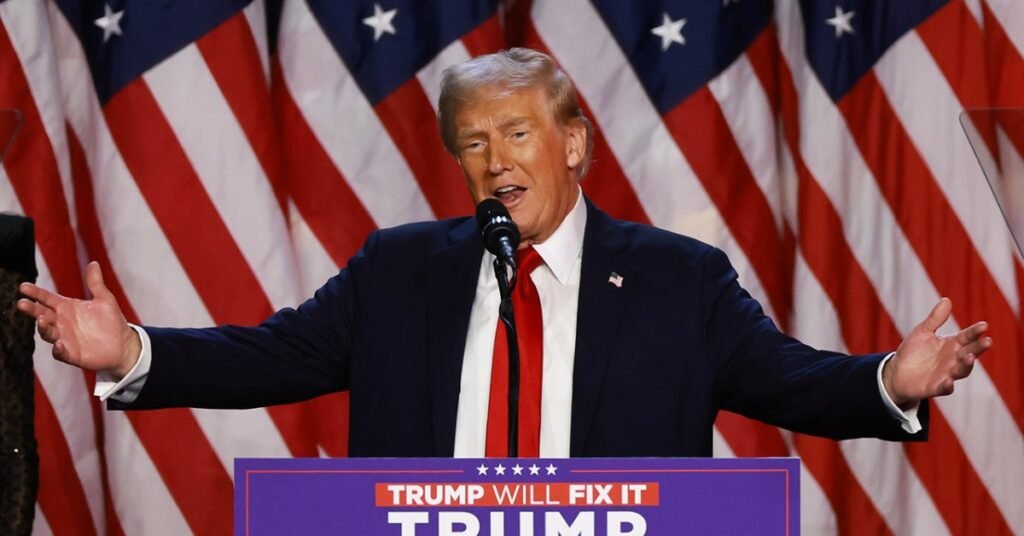Americans express ‘warmer’ feelings toward Trump today than after the 2020 or 2016 elections
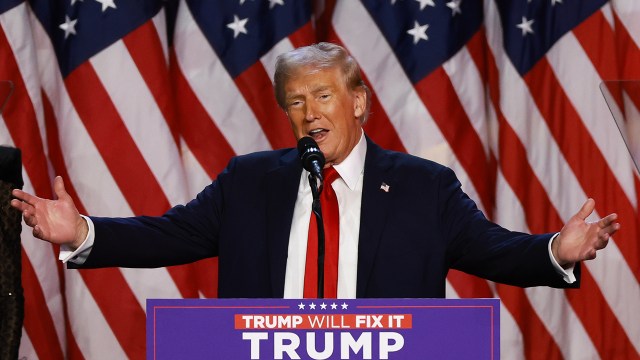
Pew Research Center conducted this study to understand Americans’ views of Donald Trump, his conduct since the election and their feelings about the country.
For this analysis, we surveyed 9,609 U.S. adults from November 12 to 17, 2024. Everyone who took part in this survey is a member of the Center’s American Trends Panel (ATP), a group of people recruited through national, random sampling of residential addresses who have agreed to take surveys regularly. This kind of recruitment gives nearly all U.S. adults a chance of selection. Surveys were conducted either online or by telephone with a live interviewer. The survey is weighted to be representative of the U.S. adult population by gender, race, ethnicity, partisan affiliation, education and other factors. In addition, this survey is also weighted to benchmarks for voter turnout and presidential vote preference. Read more about the ATP’s methodology.
Here are the questions used for this report, the topline and the survey methodology.
Following Donald Trump’s victory in the Nov. 5 presidential election, Americans narrowly approve of the president-elect’s plans and policies for the future. Roughly half of U.S. adults (53%) approve of his plans, while 46% disapprove.
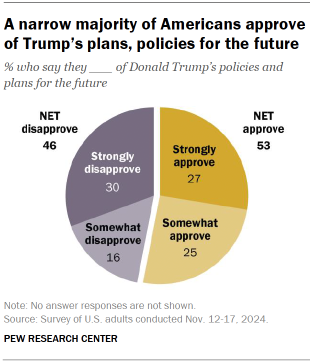
As was the case during the presidential campaign, Trump draws broad confidence for his handling of the economy. Nearly six-in-ten Americans (59%) say they are very or somewhat confident in the president-elect to make good decisions about economic policy.
Majorities also express confidence in Trump on law enforcement and criminal justice (54%), immigration (53%) and foreign policy (53%), while fewer (45%) are confident in Trump’s handling of abortion policy.
Jump to Chapter 1 for more on Americans’ views of Trump
Following a divisive presidential contest, 41% are confident in Trump to bring the country closer together; 59% express little or no confidence that Trump can do this. And Americans give Trump low marks for his efforts to date to reach out to those who supported Kamala Harris in the election.
Roughly half of Americans (52%) say it is extremely or very important for Trump to reach out to Harris’ supporters to try to unify the country. Another 30% say this is somewhat important. Only 17% say this is not too or not at all important.
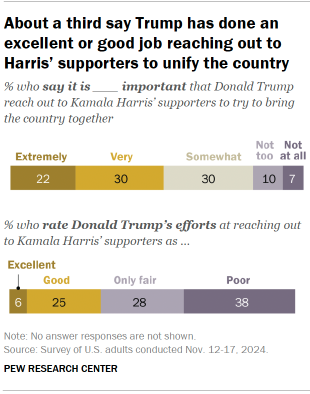
Just 31% of Americans say Trump has done an excellent or good job reaching out to the vice president’s supporters to try to bring the country together; more than twice as many (66%) say he has done only a fair or poor job.
Jump to Chapter 2 for more on expectations of the transition and Trump’s conduct
The latest national survey by Pew Research Center, conducted among 9,609 adults from Nov. 12 to 17, 2024, finds that Trump’s personal image is more positive than it was shortly after the 2020 or 2016 elections.
(Note: Most interviews were completed before Trump announced several of his nominees for Cabinet positions, including Robert F. Kennedy Jr. for secretary of Health and Human Services, and his initial selection of Matt Gaetz for attorney general)
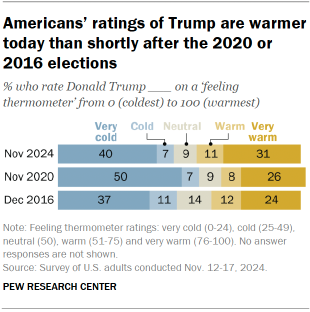
When asked to indicate their feelings toward Trump on a “feeling thermometer” ranging from 0 to 100, 43% give Trump a “very warm” or “warm” rating (between 51 and 100 on the 0-100 scale). Somewhat more (48%) give Trump a “cold” rating (below 50), including 40% who rate him “very cold” (between 0 and 24).
Still, the share of Americans rating Trump warmly today (43%) is higher than it was after the 2020 (34%) or the 2016 (36%) elections.
Fewer than four-in-ten describe Trump as even-tempered and a good role model. In evaluating Trump’s personal traits and characteristics, a 55% majority say the phrase “mentally sharp” describes Trump very or fairly well, while nearly as many (51%) say he keeps his promises.
Fewer than half describe the president-elect as caring about the needs of ordinary Americans (45%) or honest (42%).
And as was the case during the presidential campaign, Trump draws relatively low ratings for being even-tempered (37%) and a good role model (34%).
How Americans feel about the country after the election
The share of Americans who are satisfied with the way things are going in the country has increased since October, from 23% to 29%. As has been the case for the past several years, a large majority (70%) remains dissatisfied with national conditions.
Jump to Chapter 3 for more on Americans’ feelings about the state of the nation
Republicans and Democrats have traded places in their views of the country since Trump’s victory:
- 35% of Republicans and Republican-leaning independents express positive views of national conditions, up from just 10% last month.
- About a quarter of Democrats and Democratic leaners (24%) have positive views, compared with 38% in October.
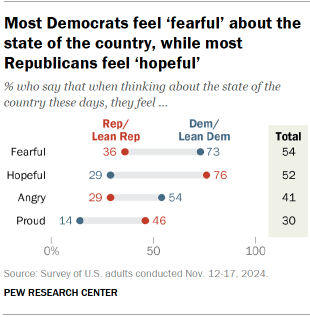
Fear and anger are dominant emotions among Democrats. Nearly three-quarters of Democrats (73%) say they are “fearful” about the state of the country, while 54% say they feel “angry.” Just 29% of Democrats feel “hopeful” and even fewer (14%) feel “proud.”
Republicans are more hopeful, less fearful. Most Republicans (76%) say they feel hopeful about the state of the country, while nearly half (46%) say they are proud. Fear and anger are less widespread among Republicans than Democrats.
Related: After Trump’s victory, Democrats are more pessimistic about their party’s future
Other findings: Presidential transition, emotional reactions to Trump’s win, the state of partisan relations
Smooth presidential transition anticipated, in contrast with 2020. A sizable majority of Americans (70%) say they are very or somewhat confident that the transition to the Trump administration will go smoothly. Republicans (79%) are more likely than Democrats (64%) to say the transition will go well. At a similar point four years ago, when Trump was contesting the election results, just 26% expected the transition to go smoothly.
Trump’s post-election conduct viewed much more positively than four years ago. Shortly after the 2020 election, only about a quarter of Americans (28%) viewed Trump’s post-election conduct as excellent or good. Today, nearly twice as many (53%) view his conduct positively. A comparable share (56%) rate Harris’ post-election conduct as excellent or good.
Reactions to Trump’s victory. Republicans are reacting to the election results with a mixture of relief (46% say they are relieved by Trump’s victory) and excitement (43%). A majority of Democrats (56%) express disappointment at the outcome, while 31% say they are angry. For the most part, reactions to Trump’s victory are comparable to his election win in 2016.
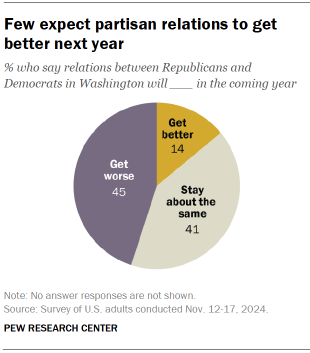
Just 14% expect partisan relations to improve. Most Americans expect relations between Republicans and Democrats in Washington to get worse (45%) or stay about the same (41%) in the coming year. In post-election surveys over the past decade, no more than about one-in-five (21% in 2020) have predicted improvement in partisan relations.
